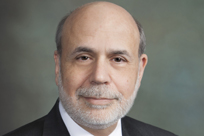 A dramatically changing pensions landscape is
having a major impact on defined contribution (DC) funds, provoking questions
about the continuing suitability of default options and what they offer
retirees. This issue is not just for the Brits as auto-enrolment takes hold,
but it affects any country where DC is the main pension pillar.
A dramatically changing pensions landscape is
having a major impact on defined contribution (DC) funds, provoking questions
about the continuing suitability of default options and what they offer
retirees. This issue is not just for the Brits as auto-enrolment takes hold,
but it affects any country where DC is the main pension pillar.
This wider impact is not necessarily driven by changing rules, but by changing valuations.
In many countries, the default lifestyle fund was built around a strategy that mechanically migrates an individual’s assets out of “risky” growth assets like equities into “lower risk”, bond-like investments in the final years approaching retirement. Reflecting country differences, some lifestyle funds retained a residual exposure to growth assets and some migrated into a mixture of cash and bonds. However, almost all followed a “de-risking” path that was mechanical and paid no attention to relative valuations. The well-intentioned purpose was to dial down the “risk” as an individual approached retirement and move their investments into strategies that had a much higher correlation with annuity pricing.
That might have been fine in the world of the “reverse yield gap,” where equities yielded less than bonds, but it is certainly not fine in a world where risk-free rates are near zero, government bonds yield next to nothing, and the “reverse yield gap” has itself reversed. This stark valuation shift totally undermines conventional DC offerings. Indeed our whole idea of what risk is needs re-thinking.
The economic proposition offered by an annuity at today’s rates—except in special circumstances such as impaired lives—is exceptionally poor. Retirees do value a guaranteed income—but unless the annuity is inflation-linked, annuities do not provide a guarantee in the only currency that matters, which is inflation-adjusted.
To take a simple example, the economic value of an equity income fund is vastly superior when compared to a fixed-rate annuity.
The starting yield is close to an annuity but, unlike the annuity, will most likely grow over time providing a measure of protection against inflation.
Equity income’s yield is close
to an annuity but, unlike the annuity, will most likely grow over time providing a measure of protection against inflation.Furthermore, on first death, the spouse’s pension
remains 100% intact as opposed to, say,
50%.
On second death the annuity expires worthless, while the equity income fund remains in the estate.
Of course, it is easy to envisage more sophisticated and resilient retirement propositions than just an equity income fund, but the point remains. At current relative valuation levels, we simply should not be migrating DC participants’ financial assets into government debt, or debt-like instruments. Nor should we be condemning retirees to an impoverished future by encouraging—or in some cases forcing—them to buy annuities.
What we should be doing is reconsidering our default lifestyle propositions and, whether we like it or not, accepting that we could need more than one option. One-size-fits-all may no longer work. The principle of migrating an individual’s assets into something resembling their probable retirement portfolio is a good one. With today’s valuations, that is much more likely to be some form of multi-asset income fund than anything resembling an annuity—or at least it should be. In this more complex world though, there could quite likely be genuine, rational reasons for individuals to want different retirement strategies. Making these choices will require a (long) conversation with each individual years ahead of retirement.
It is deeply regrettable that in many countries financial intermediaries are totally unwilling to provide advice for fear of the legal consequences. As a result, individuals are being denied help they most definitely need.
Individuals are struggling to save enough for retirement. Increasing longevity requires bigger pension pots. There is a real imperative for the industry to come up with default lifestyle propositions and decumulation products that are fit for today’s purpose. We have a moral duty to make sure that we don’t waste precious retirement assets.
They—and we—have a lot of work to do.
Alan Brownis the former Group CIO of Schroders.

 Ben Bernanke, former Federal Reserve chairman
Ben Bernanke, former Federal Reserve chairman